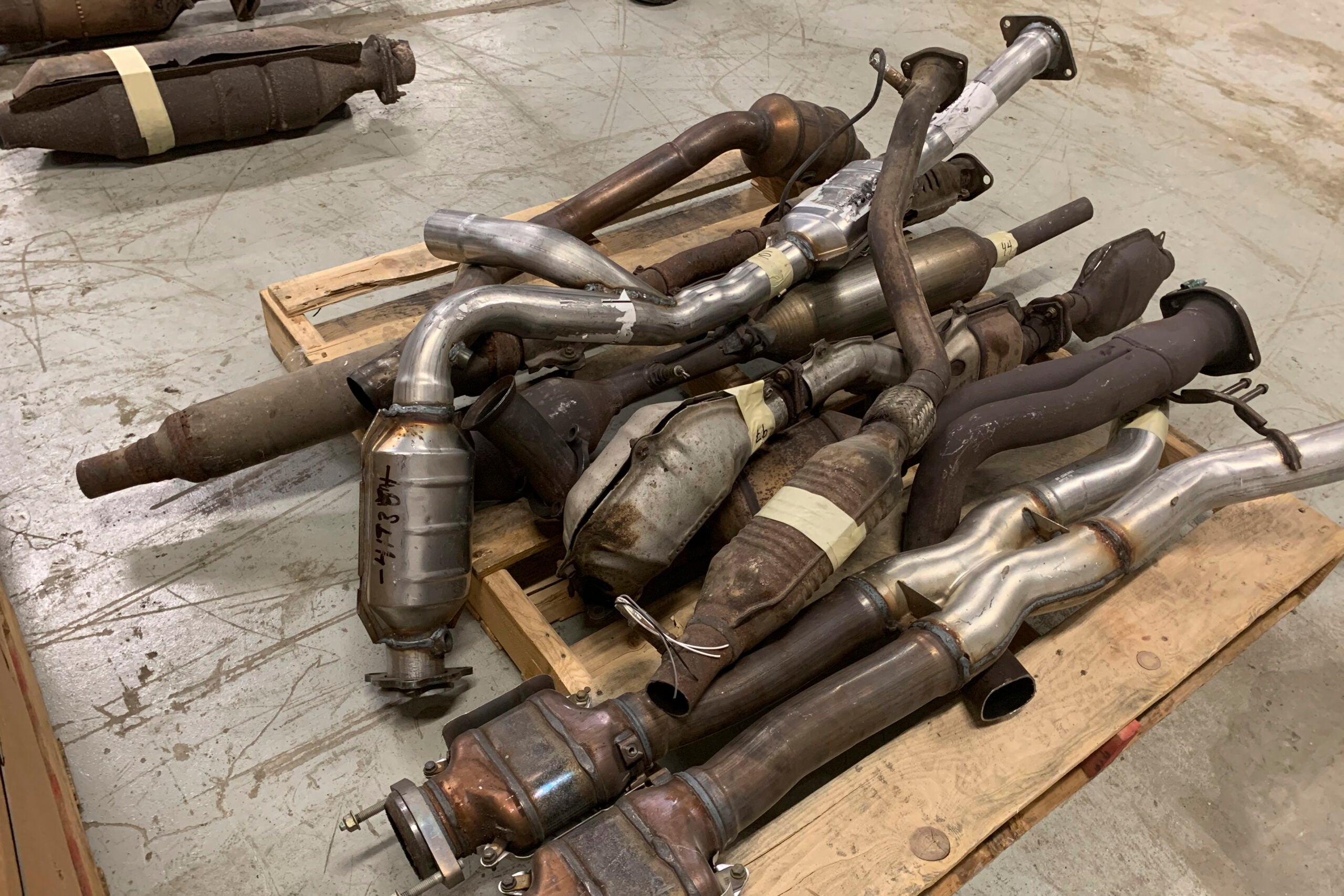One day this August, Paul Schechter went to move his Toyota Tacoma for alternate-side parking in Madison. When he started the ignition, it sounded like a jet engine roaring. He thought his muffler was shot. But when he moved his truck, he noticed a dirty rag and scrap metal on the street where it had been parked.
He sent photos to his mechanic who quickly confirmed his catalytic converter had been stolen.
[[{“fid”:”1590706″,”view_mode”:”embed_landscape”,”fields”:{“format”:”embed_landscape”,”alignment”:”right”,”field_image_caption[und][0][value]”:”%3Cp%3EA%20heat%20shield%20lies%20on%20the%20ground%20after%20thieves%20stole%20the%20catalytic%20converter%20from%20Madison%20resident%20Paul%20Schechter’s%20truck%20in%20August%202021.%20%3Cem%3EPhoto%20Courtesy%20of%20Paul%20Schechter%3C%2Fem%3E%3C%2Fp%3E%0A”,”field_image_caption[und][0][format]”:”full_html”,”field_file_image_alt_text[und][0][value]”:”A heat shield lies on the ground after thieves stole the catalytic converter”,”field_file_image_title_text[und][0][value]”:”A heat shield lies on the ground after thieves stole the catalytic converter”},”type”:”media”,”field_deltas”:{“1”:{“format”:”embed_landscape”,”alignment”:”right”,”field_image_caption[und][0][value]”:”%3Cp%3EA%20heat%20shield%20lies%20on%20the%20ground%20after%20thieves%20stole%20the%20catalytic%20converter%20from%20Madison%20resident%20Paul%20Schechter’s%20truck%20in%20August%202021.%20%3Cem%3EPhoto%20Courtesy%20of%20Paul%20Schechter%3C%2Fem%3E%3C%2Fp%3E%0A”,”field_image_caption[und][0][format]”:”full_html”,”field_file_image_alt_text[und][0][value]”:”A heat shield lies on the ground after thieves stole the catalytic converter”,”field_file_image_title_text[und][0][value]”:”A heat shield lies on the ground after thieves stole the catalytic converter”}},”link_text”:false,”attributes”:{“alt”:”A heat shield lies on the ground after thieves stole the catalytic converter”,”title”:”A heat shield lies on the ground after thieves stole the catalytic converter”,”class”:”media-element file-embed-landscape media-wysiwyg-align-right”,”data-delta”:”1″}}]]The mechanic replaced it for $1,000 with an aftermarket part, which he said would be less desirable for thieves. Schechter even wrote on it with a permanent marker, “This is an aftermarket, please don’t steal.”
News with a little more humanity
WPR’s “Wisconsin Today” newsletter keeps you connected to the state you love without feeling overwhelmed. No paywall. No agenda. No corporate filter.
But a week and a half later, it was stolen again.
Over the past six months, stories of increased catalytic converter thefts have popped up across Wisconsin — from Milwaukee and Madison to Green Bay and Chippewa Falls.
But a new state law could help deter would-be thieves.
Assembly Bill 415, and the identical Senate Bill 408, would add catalytic converters to a list of “proprietary articles” whose sales are regulated by law — things like copper and aluminum conductors and wires, railroad ties, metal grave markers, manhole covers and metal beer kegs.
Under the new law, anyone selling a catalytic converter to a scrap dealer would need to be 18 years of age and would be required to show personal identification and proof of lawful ownership. Scrap dealers would be required to maintain sales records and when proof of ownership isn’t provided, refuse the sale and report the incident to law enforcement within one business day.
If a scrap dealer fails to comply with the new law, they could face a $1,000 fine and/or 90 days in jail. For a second offense, the penalty jumps to $10,000 and up to nine months in jail.
The bill was authored and introduced by state Rep. Clint Moses, R-Menomonie, in June. Moses said catalytic converter theft was a big issue on the University of Wisconsin-Stout campus, school bus companies were complaining about it and law enforcement from across the Chippewa Valley were asking him to do something.
“We had people trickling over from Minnesota, cutting catalytic converters off anytime a day, middle of the night, people are at work, people are sleeping,” said Moses. “They’re very brazen as far as when they’ll do it.”
Moses said that part of the reason thieves were coming from across the border was because Minnesota recently passed legislation cracking down on sales of catalytic converters. This, along with pleas from local law enforcement, is what motivated Moses to draft a bill for his own state.
State Sens. Kathleen Bernier, R-Chippewa Falls, and Lena Taylor, D-Milwaukee, along with others, quickly signed on, introducing an identical bill in the Senate.
“In my district and all across the state, thefts of catalytic converters rob people of their sense of security and their mobility as they await costly repairs and live in fear of a repeat crime,” said Bernier. “Law enforcement and other constituents in my district have been vocal about the need to do something.”
Catalytic converters are a part of a car’s exhaust system, responsible for filtering out toxins from the emissions. But without unique serial numbers, they can be difficult to trace once stolen.
And it happens quickly. Thieves cut out the converter in under two minutes and then sell it for the precious metals it contains, such as rhodium, palladium and platinum.
As prices for these metals increased rapidly during the COVID-19 pandemic, so did catalytic converter thefts across the country. According to data from the National Insurance Crime Bureau, there were 3,389 reports of catalytic converter thefts in 2019 — about 282 per month. In 2020, thefts grew by 325 percent to a whopping 14,433 thefts, with 2,347 thefts in the month of December alone.
And the surge has continued. In the Madison area, there have already been more than 300 thefts this year, said Moses.
“Recently, it’s just gone nuts,” said Wayne Schmiedlin, owner of Wayne’s Automotive in Madison.
Schmiedlin said he has had three catalytic converters stolen from his property this year and has replaced several for his customers.
He said a catalytic converter generally sells for about $75 to $100, but some, like the Toyota Prius and other hybrid vehicles, sell for as much as $1,500 because they contain more of the precious metals.
For car owners, it costs anywhere from $1,000 to $2,000 to replace a stolen converter and insurance doesn’t always cover it, Schmiedlin said, adding that he thinks the new law is a good idea.
The bill has bipartisan support and is likely to pass a floor vote in both chambers, which means it could be heading to Gov. Tony Evers’ desk soon.
Difficult to enforce
But some worry the new law could create a mountain of paperwork for business owners and would be difficult to enforce.
Scrap dealer and auto shop owner George Boyer said the new law places the burden on small businesses. Boyer said his shop, American Auto Madison, scraps nearly 4,000 cars a year.
“I’ve had 1,000 converters in my possession before, you know, I might have 30 right now,” said Boyer. “How to prove where they ever come from is going to be nearly impossible.”
Boyer holds a Salvage dealer license from the state Department of Transportation and said he documents every sale but tracking individual parts is tough.
“You’re never going to be able to make any salvage person document every converter. It’s just not realistic,” said Boyer.
He recommends making sure that anyone buying a catalytic converter has a proper salvage license.
But even with licensed scrap dealers, theft is still happening. Lorie Anderson, of the Madison Police Department, said rules don’t always deter criminals.
“If somebody illegally obtained the catalytic converter — this is just my opinion, but I doubt that they’re going to show identification,” said Anderson.
And if a seller refuses to show an ID, they can walk away and face no consequences, said Anderson.
Boyer agrees. Even with regulation, there will still be an underground market, he said.
“That’d be like saying, ‘Hey, do you think the sale of drugs in America is ever going to stop since we made harsher drug laws?’ Criminals are criminals. There’s always going to be somewhere to take something,” said Boyer.
Still, Anderson said she supports the bill, even with the challenge of enforcement.
“Clearly, that’s the ideal,” said Anderson. “That’s why we put up speed signs, so we can discourage speeding and encourage safe driving behavior, right? We can’t be everywhere to enforce that.”
In the meantime, some mechanics have gotten creative to help vehicle owners protect themselves. Some are welding in bars, brackets and braces like the Cat Shield to cage in their converters. Paul Schechter’s mechanic was offering Prius owners $600 cash to swap out their catalytic converter with a less-desirable aftermarket part.
Unfortunately, that didn’t work for Schechter.
Because his truck is old, Schechter didn’t bother with comprehensive coverage so insurance wouldn’t cover the repair and he didn’t feel like shelling out another $1,000. For now, he’s getting around town on his electric bike. But he does see a silver lining to the situation.
“It will be a great motivator for me to get an electric vehicle, which doesn’t need a catalytic converter,” said Schechter. “Just waiting on the (federal) infrastructure bill to come through for that.”
Wisconsin Public Radio, © Copyright 2026, Board of Regents of the University of Wisconsin System and Wisconsin Educational Communications Board.




